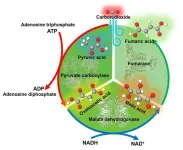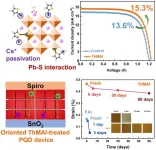(Press-News.org) Houston, Texas – In a state-of-the-art Bench to Bedside review published in the journal Brain Medicine (Genomic Press), researchers Dr. Xiaoyu Song and Professor Jan-Åke Gustafsson from the University of Houston and Karolinska Institutet (Sweden) shed light on the therapeutic potential of liver X receptor beta (LXRβ) in treating depression and anxiety. This comprehensive analysis marks a significant step forward in understanding the molecular underpinnings of mental health disorders and potentially revolutionizing their treatment.
LXRβ, a nuclear receptor initially known for its role in cholesterol metabolism and inflammation, is now emerging as a crucial player in neuroscience and psychiatry. The review synthesizes recent breakthroughs in understanding LXRβ's regulation and function in behaviors relevant to depression and anxiety, derived from studies using animal models that capture specific features of these disorders.
"Our analysis reveals that LXRβ plays a pivotal role in preventing central nervous system disease in experimental rodent models," explains Dr. Song. "If these observations translate to humans, LXRβ could emerge as a novel therapeutic target for treating neuropsychiatric disorders, particularly depression and anxiety."
The researchers highlight several key findings:
1. LXRβ deficiency in female mice leads to anxiety-like behavior and impaired behavioral responses.
2. Activation of LXRβ in the amygdala exerts anxiolytic effects by rebalancing excitatory and inhibitory neurotransmission.
3. LXRβ signaling regulates neurogenesis and enhances cognitive function, which may have implications for treating depression.
These discoveries raise intriguing questions for future research. Could LXRβ-targeted therapies offer a new approach to treating treatment-resistant depression? How might the sex-specific effects of LXRβ influence personalized medicine approaches in psychiatry?
The Bench to Bedside review also explores the role of LXRβ in autism spectrum disorder (ASD), suggesting potential connections between cholesterol metabolism, brain development, and ASD symptoms. This unexpected link prompts further inquiry: Could modulating LXRβ activity provide a novel intervention strategy for ASD?
Professor Gustafsson emphasizes the broader implications of their findings: "The connection between LXRβ, traditionally associated with metabolic functions, and complex psychiatric disorders like depression and anxiety, underscores the interconnectedness of biological systems. It challenges us to think more holistically about mental health and its underlying molecular mechanisms."
As research in this field progresses, several questions emerge: How do environmental factors influence LXRβ activity in the brain? Could lifestyle interventions that affect cholesterol metabolism indirectly impact mental health through LXRβ-mediated pathways?
While the findings are promising, the authors caution that additional basic research and clinical trials are necessary to determine whether novel drugs targeting LXRβ can be effectively utilized in treating neurological and neuropsychiatric diseases. This prudent approach raises another critical question: What are the potential long-term effects of modulating LXRβ activity, given its wide-ranging functions in the body?
The peer-reviewed Bench to Bedside review, titled "Therapeutic potential of liver X receptor beta in depression and anxiety," was published on 4 October 2024 issue of Brain Medicine. It represents a significant contribution to the field of neuropsychiatry and opens new avenues for drug development and personalized medicine approaches in mental health treatment. The article is freely available online at https://bm.genomicpress.com/aop/
About Brain Medicine: Brain Medicine (ISSN: 2997-2639) is a peer-reviewed journal published by Genomic Press, New York. Brain Medicine is a new home for the cross-disciplinary pathway from innovation in fundamental neuroscience to translational initiatives in brain medicine. The journal’s scope includes the underlying science, causes, outcomes, treatments, and societal impact of brain disorders, across all clinical disciplines and their interface.
END
Liver X receptor beta: a new frontier in treating depression and anxiety
Cholesterol regulator emerges as a surprising player in mental health research
2024-10-04
ELSE PRESS RELEASES FROM THIS DATE:
Improving fumaric acid production efficiency through a ‘more haste, less speed’ strategy
2024-10-04
As plastic waste continues to build up faster than it can decompose, the need for biodegradable solutions is evident.
Previously, Professor Yutaka Amao and his team at Osaka Metropolitan University’s Research Center for Artificial Photosynthesis succeeded in synthesizing fumaric acid, a raw material for biodegradable plastics from biomass-derived pyruvic acid and carbon dioxide. However, the fumaric acid production process reported earlier has a problem with producing undesirable substances as byproducts in addition to L-malic acid, which is ...
How future heatwaves at sea could devastate UK marine ecosystems and fisheries
2024-10-04
The oceans are warming at an alarming rate. 2023 shattered records across the world’s oceans, and was the first time that ocean temperatures exceeded 1oC over pre-industrial levels. This led to the emergence of a series of marine heatwave events across both hemispheres, from the waters around Japan, around South America, and across the wider North Atlantic. Marine heatwaves are periods of extremely warm sea temperatures that can form in quite localized hot spots but also span large parts of ocean ...
Glimmers of antimatter to explain the "dark" part of the universe
2024-10-04
One of the great challenges of modern cosmology is to reveal the nature of dark matter. We know it exists (it constitutes over 85% of the matter in the Universe), but we have never seen it directly and still do not know what it is. A new study published in JCAP has examined traces of antimatter in the cosmos that could reveal a new class of never-before-observed particles, called WIMP (Weakly Interacting Massive Particles), which could make up dark matter. The study suggests that some recent observations ...
Kids miss out on learning to swim during pandemic, widening racial and ethnic disparities
2024-10-04
Nearly three out of four kids in Chicago had no swimming lessons in summer of 2022, with significant racial and ethnic differences, according to a parent survey from Ann & Robert H. Lurie Children’s Hospital of Chicago published in Pediatrics. Black and Hispanic/Latine kids were disproportionately affected (85 percent and 82 percent, respectively), compared to white kids (64 percent).
The most common reasons for not getting swimming lessons also differed among racial and ethnic groups. Parents of White kids reported they ...
DGIST restores the performance of quantum dot solar cells as if “flattening crumpled paper!”
2024-10-04
□ Professor Jongmin Choi’s team from the Department of Energy Science and Engineering at DGIST (President Kunwoo Lee) conducted joint research with Materials Engineering and Convergence Technology Professor Tae Kyung Lee from Gyeongsang National University and Applied Chemistry Professor Younghoon Kim from Kookmin University. The researchers developed a new method to improve both the performance and the stability of solar cells using “perovskite quantum dots.” They developed longer-lasting solar cells by addressing the issue of distortions on the surface of quantum dots, which deteriorate the ...
Hoarding disorder: ‘sensory CBT’ treatment strategy shows promise
2024-10-04
Rehearsing alternative outcomes of discarding through imagery rescripting shows promise as a treatment strategy for people who hoard, a study by UNSW psychology researchers has shown.
Hoarding disorder is a highly debilitating condition that worsens with age. People who hoard form intense emotional attachments to objects, accumulate excessive clutter, and have difficulty discarding possessions. Many avoid treatment.
People who hoard also experience more frequent, intrusive and distressing mental images in their daily lives, says Mr Isaac Sabel from the Grisham Research Lab, an experimental clinical psychology research group at UNSW Sydney.
“Negative ...
Water fluoridation less effective now than in past
2024-10-04
The dental health benefits of adding fluoride to drinking water may be smaller now than before fluoride toothpaste was widely available, an updated Cochrane review has found.
The team of researchers from the Universities of Manchester, Dundee and Aberdeen reviewed the evidence from 157 studies which compared communities that had fluoride added to their water supplies with communities that had no additional fluoride in their water. They found that the benefit of fluoridation has declined since the 1970s, when fluoride toothpaste became more widely available.
The contemporary studies were conducted in high-income countries. The impact of community water fluoridation ...
Toddlers get nearly half their calories from ultra-processed foods
2024-10-04
Toddlers in the UK obtain nearly half (47%) of their calories from ultra-processed foods (UPFs), and this rises to 59% by the age of seven, according to a new study led by UCL researchers.
The study, published in the European Journal of Nutrition, looked at data from 2,591 children born in the UK in 2007 and 2008 whose parents recorded what their children ate and drank over three days.
The most common UPFs consumed by the toddlers – who were 21 months when their parents recorded their diets – were flavoured ...
Detroit researchers to examine links between bacterial infections, environmental pollution and preterm birth
2024-10-03
DETROIT — A new grant will help Wayne State University researchers explore the links between bacterial infections, the environmental factors that increase their susceptibility and the risk of preterm birth.
The five-year, $2,858,821 grant from the National Institute of Environmental Health Sciences of the National Institutes of Health, “PFAS increases susceptibility to infection-mediated preterm birth,” will be led by Michael Petriello, Ph.D., assistant professor in Wayne State’s Institute of Environmental Health Sciences and Pharmacology in the School of Medicine.
Petriello hopes that the team’s studies will identify critical pathways responsible ...
In lab tests, dietary zinc inhibits AMR gene transmission
2024-10-03
Highlights:
Antimicrobial resistance is a growing threat.
Bacteria exchange AMR genes in the gut via circular genetic material called plasmids.
In lab experiments, bacteria transferred plasmids with AMR genes in the presence of zinc at reduced or nonexistent rates.
Stopping the transfer without killing microbes may help reduce AMR without disrupting the gut microbiome.
Washington, D.C.—Genes responsible for antimicrobial resistance (AMR) can spread from microbe to microbe through circular genetic material called plasmids, and ...
LAST 30 PRESS RELEASES:
Next-generation CAR-T designs that could transform cancer treatment
As health care goes digital, patients are being left behind
A clinicopathologic analysis of 740 endometrial polyps: risk of premalignant changes and malignancy
Gibson Oncology, NIH to begin Phase 2 trials of LMP744 for treatment of first-time recurrent glioblastoma
Researchers develop a high-efficiency photocatalyst using iron instead of rare metals
Study finds no evidence of persistent tick-borne infection in people who link chronic illness to ticks
New system tracks blockchain money laundering faster and more accurately
In vitro antibacterial activity of crude extracts from Tithonia diversifolia (asteraceae) and Solanum torvum (solanaceae) against selected shigella species
Qiliang (Andy) Ding, PhD, named recipient of the 2026 ACMG Foundation Rising Scholar Trainee Award
Heat-free gas sensing: LED-driven electronic nose technology enhances multi-gas detection
Women more likely to choose wine from female winemakers
E-waste chemicals are appearing in dolphins and porpoises
Researchers warn: opioids aren’t effective for many acute pain conditions
Largest image of its kind shows hidden chemistry at the heart of the Milky Way
JBNU researchers review advances in pyrochlore oxide-based dielectric energy storage technology
Novel cellular phenomenon reveals how immune cells extract nuclear DNA from dying cells
Printable enzyme ink powers next-generation wearable biosensors
6 in 10 US women projected to have at least one type of cardiovascular disease by 2050
People’s gut bacteria worse in areas with higher social deprivation
Unique analysis shows air-con heat relief significantly worsens climate change
Keto diet may restore exercise benefits in people with high blood sugar
Manchester researchers challenge misleading language around plastic waste solutions
Vessel traffic alters behavior, stress and population trends of marine megafauna
Your car’s tire sensors could be used to track you
Research confirms that ocean warming causes an annual decline in fish biomass of up to 19.8%
Local water supply crucial to success of hydrogen initiative in Europe
New blood test score detects hidden alcohol-related liver disease
High risk of readmission and death among heart failure patients
Code for Earth launches 2026 climate and weather data challenges
Three women named Britain’s Brightest Young Scientists, each winning ‘unrestricted’ £100,000 Blavatnik Awards prize
[Press-News.org] Liver X receptor beta: a new frontier in treating depression and anxietyCholesterol regulator emerges as a surprising player in mental health research



